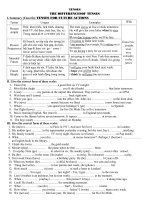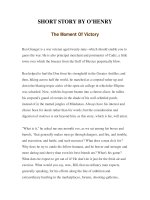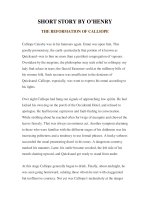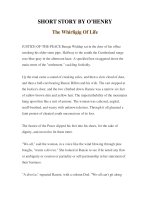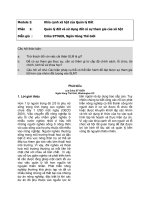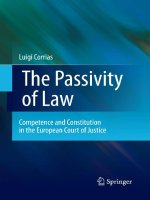THE DIFFERENCES OF TENSES.doc
Bạn đang xem bản rút gọn của tài liệu. Xem và tải ngay bản đầy đủ của tài liệu tại đây (140.36 KB, 4 trang )
TENSES
THE DIFFERENCESOF TENSES
I. Summary (Tóm tắt): TENSES FOR FUTURE ACTIONS
Tenses Usages Examples
With
Present
simple
Thời khoá biểu, lịch trình, chương
trình TV, thể thao, máy bay, tàu, xe:
Trong mệnh đề IF và WHEN (chỉ TL)
The train leaves at five o’clock tomorrow.
He will give her your letter when he sees
her tomorrow.
If you don’t come early, we’ll be late.
Tomorrow,
tonight,
soon,
next,
someday,
in the
future
Present
Progressive
Kế hoạch, sự sắp xếp cho tương lai
gần cho các cuộc hẹn gặp, du lịch,
hội họp đi kèm với go / come /
leave/ arrive/ have/ meet
I’m going to Dalat next week.
I am m eeting Peter tonight. He’s taking me to
the theater.
We are having a party for our son next week.
Intended
Future
Ý định đã được dự trù trước khi nói
hoặc sự suy đoán chắc chắn dựa vào
căn cứ hiện tại:
I am going to visit New York this summer.
There are a lot of clouds. I think it is going
to rain.
Future
Simple
Ý định ngay khi nói. Ý kiến, lời hứa,
hy vọng, phát biểu, tiên đoán chủ
quan về một hành động trong tương
lai:
I will give your book back next week.
I hope you will be lucky.
I think he will pass the next exam.
II. Give the correct form of these verbs:
1. There (be) …………………………. a good film on TV tonight.
2. Miss Helen (help) ……………………… you if she (finish) …………………… that letter tomorrow.
3. I (see) …………… my parents at the airport this afternoon. They (arrive) ……………… at 4 PM.
4. Wait here and I (come) ……………………… back right now.
5. When you (go) …………………… into the office, Mr. John (is) ………………… at the front desk.
6. We (save) …………………… money because we (buy) …………………… a new house next year.
7. Where …………………… you spend your holidays? I (go) …………………… to Spanish.
8. Our flight (leave) …………………… for Ho Chi Minh City at five tomorrow.
9. Mai is learning English. She (travel) …………………… to England next month.
10. Come to the library before seven tomorrow. It (open) …………………… at seven am.
11. The boys (start) …………………… school on Monday.
III. Give the correct form of these verbs:
1. He (move) ……………………. to Paris in 1917. And now he (live) ……………………. in London.
2. My mother (go) ……...... to the supermarket yesterday evening, but she (not, buy) …..……….anything.
3. My family (watch) ……………. TV every night. But now we (listen) …………………. to Pop musiC.
4. What…………………. you (do) …………………. at recess tomorrow? -Perhaps, I (borrow) ……………….
an English book in the library.
5. I think she (win) ………………. the gold medal.
6. Mozart (play)……………… the piano when he (be) ………………. three.
7. Everyday Nam (go) …………. to school at six. He usually (play) …………. soccer after school.
8. Ba (be) ………….. in the room. He (make) …………. so noisy. He (rehearse) ….........………. a play.
9. Next week Doan (have) ……………. a birthday party. He (be) ……………. 14 years olD.
10. When my brother (be) ……………. a child, he (have) ……………. two cats and a dog.
11. Trang (not write) ……………. to her parents last week; she (phone) ……………. her.
12. How much ……………. it (cost) ……………. to mail a letter to London?
13. …………..…You (go) ……………. last night? - Yes, I (go) ……………. to the movies.
14. Lien’s brother is an architect, but he (not work) ……...........………. at the moment.
15. When ……………. you(buy) ……………. this picture? I (buy) ……………. it along time ago.
16. Look! He (look) ……………............ for something at present.
17. What ……………. you (do) ……………. Tan? - I (write) ……………. a letter.
18. How often …………. you (write) …………. letters? I (write) ……………. them every week.
19. We (not see) ……………. him last year. He (leave) ……………. for Ho Chi Minh.
20. I (see) …………...…. a movie tonight. ……………. you (go) ……………. with me?
IV. The differences between present simple and present progressive:
Present simple Present progressive
1. Hành động có tính bền vững, luôn luôn đúng
theo thói quen, phong tục và khả năng:
- I work in New York.
2. Nhận thức, tình cảm, tình trạng xảy ra lúc đang
nói:
I know you are busy now.
3. Thời khoá biểu, lịch trình các chương trình:
The train for Hanoi leaves at 7.30 tonight.
4. Chân lý hiển nhi ên:
- It rains a lot in HCM City.
1. Hành động có tính tạm thời, không thường xuyên:
(today, this week, this year...)
- I’m working in New York for a few weeks.
2. Không dùng thì này với các hoạt động nhận thức, tình
cảm, tình trạng, sở hữu, tồn tại: see, think, believe, feel,
look smell, taste, hear, expect, assume
3. Kế hoạch, sự sắp xếp cho tương lai gần:
- She is arriving at 11 o’clock.
4. Dùng kèm với ALWAYS diễn tả sự phàn nàn:
He is always coming to class late.
V. Give the correct form of these verbs: (Present simple and present progressive)
1. The sun (set) …………in the West. The earth (circle) ……………the Sun once every 365 days.
2. It usually (rain) ……………in the summer. Rivers usually (flow) ………………to the sea.
3. They (often build) ………………… hotels, but this year they (build) ……………… hospitals.
4. Bees (make) …………………………honey.
5. They (get) …………………………on the scale now.
6. Don’t worry. I (give) ……………………him your message when I (see) ……………………… him.
7. Look! Jane (play) ..................... the guitar. this afternoon she (play) …………………… table tennis.
8. I (not talk) …………………………to her at present.
9. How often…………………………she (go) …………………………fishing?
- She (go) …………………………once a year.
10. .............. your friends (be)…………………… students? - Yes, they (be) ..........................
11. ................ the children (play…………………………in the park at the moment?
- No, they aren’t. They (learn) ..................................... to play the piano.
12. ………….you (go)………………………….. to school on Sundays? – Yes, I do.
13. My mother (cook) ………………………a meal now. She ( cook) ………………………everyday.
14. What…………your mother (do)……………. at this time? - She (make) ………………a dress.
15. ............. she often (go)……………………… to the cinema every weekend?
- I don’t know. But she always (go) ......................... to the church on Sundays.
16. Hurry up! The bus (come) …………………………… .
19. The students (not be) …………………………in class at present.
20. She always (wash) …………………………the dishes after meals.
21. What____________ your father usually ____________ (do) in the evenings ?
22. He usually ____________ (watch)TV. He (not talk) ____________ to her at present.
23. He____________ (be) out at the moment but he____________ (be) back at about seven o’clock.
24. I can ____________ (see) the children. They____________ (play) in the yard.
VI. The differences between intended future and future simple:
Intended future Future simple
1. Ý định đã được dự trù, sắp xếp trước khi nói:
- Iam going to visit New York this summer.
2. Sự suy đoán chắc chắn dựa vào căn cứ hiện
tại:
- There are a lot of clouds. I think it is going to
rain.
1. Ý định ngay khi nói hay hành động sẽ xảy ra ở tương
lai không phụ thuộc vào ý định:
- He will come here tomorrow.
2. Ý kiến, lời hứa, hy vọng, phát biểu về một hành
động trong tương lai: (think, promise, hope, expect..)
- Wait here and I will get you a drink.
- I think you will pass the exam.
VII. Give the correct form of these verbs: (Intended future and Future simple)
1. I think she (win) …………………………the gold medal.
2. They (build) …………………………a house by June next year.
3. Don’t worry. I (give) …………………………him your message when I see him.
4. I (meet) …………………………Jane next week.
5. What…………your mother (do) …………………next week? - She (make)…………………a dress.
6. The students (not go ) …………………………on a trip next week.
7. My mother is saving money because they ( buy) ……………………… a new house next year.
8. She is preparing her trip now. She (visit) …………………… her friends tonight.
9. What …………you (do)………………….. this Sunday? - I (visit) ......................... my grandparents.
10. I think Liz and her parents (go) ………………………to Tri Nguyen Aquarium in Nha Trang.
VIII. Present simple and Future simple trong mệnh đề điều kiện và mệnh đề thời gian chỉ tương lai:
- Mệnh đề thời gian:
S +Will + V
1
+ When/ while/ after/ before/ as/until + S + V (Present simple)
When/ while/ after/ before/ as/until + S + V (Present simple), S +Will + V
1
When he comes tomorrow, we will welcome him.
- Mệnh đề điều kiện:
S +Will + V
1
+ if + S + V (Present simple)
If + S + V (Present simple),S +Will + V
1
If she visits me next week, we will have dinner together.
IX. Give the correct form of these verbs:
12. We’ll go out when the rain (stop) ………………………….
13. Miss Helen (help) …………………… you if she (finish) …………………… that letter tomorrow.
14. I (come) ……………………… and (see) ……………………… you before I leave here.
15. I (wait) ……………………… he if you (come) ……………………… back tomorrow.
16. I (send) …………………… you some postcards as soon as I (arrive) …………………… in London.
17. I’ll wait until he (finish) ……………………… his novel.
18. I (give) ……………………… her your letter if I (see) ……………………… her tomorrow.
19. When you (go) ………………… into the office, Mr. John (sit) …………………… at the front desk.
20. We (wait) ……………………… for you when you (get) ……………………… back tomorrow.
21. If you (come) ……………………… today, I (work) ……………………… at my desk in Room 12.
22. I (give) ……………………… her your letter when I (see) ……………………… her tomorrow.
23. As you (go) ………………… back home, your children (wait) ………………… at the front door.
XI. Summary (Tóm tắt):
Tenses Affirmation (KĐ) Negation (PĐ) Interrogation (NV) With
Past
Simple
S + V
2
- V- ed
(be): S + was- were
S + didn’t + V
1
S + wasn’t - weren’t
Did + S + V
1
?
Was- were + S +..?
Yesterday, ago, last, this
morning, that day, once, first,
next, then, after that, at last,
finally …
XII. Usage (Cách dùng): Thì quá khứ đơn được dùng để diễn tả:
1. Hành động đã xảy ra trong QK xác định rõ thời gian: Yesterday: hôm qua/ Last night: tối qua/ In 1979 < now/
(3 days) ago: cách đây……
VD: He (be, not) there last year.
He was not there last year.
2. Thói quen, loạt hành động kế tiếp nhau trong quá khứ: First: lúc đầu, later, then, after that: sau đó, finally, at
last: cuối cùng....
VD: When I was a boy, I often played football.
3. - Hành động đã xảy ra suốt một khoảng thời gian trong QK:
VD: I worked there for a few days.
XIII. Spelling notes ( Cách thêm ”ED”):
- Thêm d nếu động từ kết thúc bằng e: like
→
liked, arrive
→
arrived
- Gấp đôi phụ âm nếu động từ một vần kết thúc bằng nguyên âm (u,e o, a, i) và một phụ âm:
stop
→
stopped, fit
→
fitted
- Chuyển y
→
i + ed nếu động từ một vần kết thúc bằng một phụ âm +y:
study
→
studied, try
→
tried
- Còn lại thì thêm ed: enjoy
→
enjoyed, look
→
looked, work
→
worked,
XIV. Pronunciation of the ending sound “ED” (Cách đ ọc ”ED”):
Âm cuối t, d p, k, f, s, sh, ch, gh b ,g ,n ,l z, v ,m, r, y, u, e, o, a, I, w
Đọc -id- -t- -d-
Ví dụ Wanted, fitted, needed Stopped, talked, washed, laughed Enjoyed, loved, played, tried, arrived
XV. Give the past form of these verbs: (Hãy cung cấp dạng quá khứ của các động từ sau)
1. visit visited Thăm, viếng 11. have had có
2. arrive ……………… ……………… 12. be ……………… ………………
3. remember ……………… ……………… 13. go ……………… ………………
4. cook ……………… ……………… 14. buy ……………… ………………
5. rent ……………… ……………… 15. take ……………… ………………
6. receive ……………… ……………… 16. see ……………… ………………
7. move ……………… ……………… 17. think ……………… ………………
8. watch ……………… ……………… 18. wear ……………… ………………
9. learn ……………… ……………… 19. eat ……………… ………………
10.decide ……………… ……………… 20. make ……………… ………………
XI. Put the following verbs into the same column based on the “ed” sound:
Wanted, fitted, needed, helped, stopped, talked, washed, leaned, laughed, enjoyed, loved, played, tried, decided,
watched, looked, studied, remembered, visited, walked, rented, missed, received, moved, arrived
- id - - t - - d -
XII. Fill in the gaps with a suitable word provided to make the sentences meaningful, use past form:
go - be - return - cut - can - have - buy - cook
I thought that cooking…………… a useful hobby. Yesterday I ………… to the market. I ………… some meat
and vegetables. When I ……… home, I ……… the meat into slices. Then I ………… it with the vegetables.
Finally, I …………… a good meal with my family. Now I ………….cook meals for my family.
